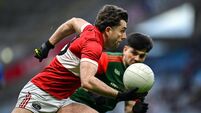Alan Mulholland: ‘We have never come across lack of integrity in any GAA match’

Mulholland backs the GAA’s new rule which prohibits a player, management team member or match official from gambling on a game in which they are involved. Even though he believes policing it is “nearly impossible”, he can appreciate why the rule has been introduced, recognising the integrity of competition must be upheld.
Although teams will no longer be able to back themselves to win games, the Salthill-Knocknacarra man sees nothing wrong in them backing themselves to do well in competitions. “We have accepted collective bets from teams to win championships. I didn’t see anything wrong with panels coming together, pooling their money and using it that way as a healthy form of motivation.














